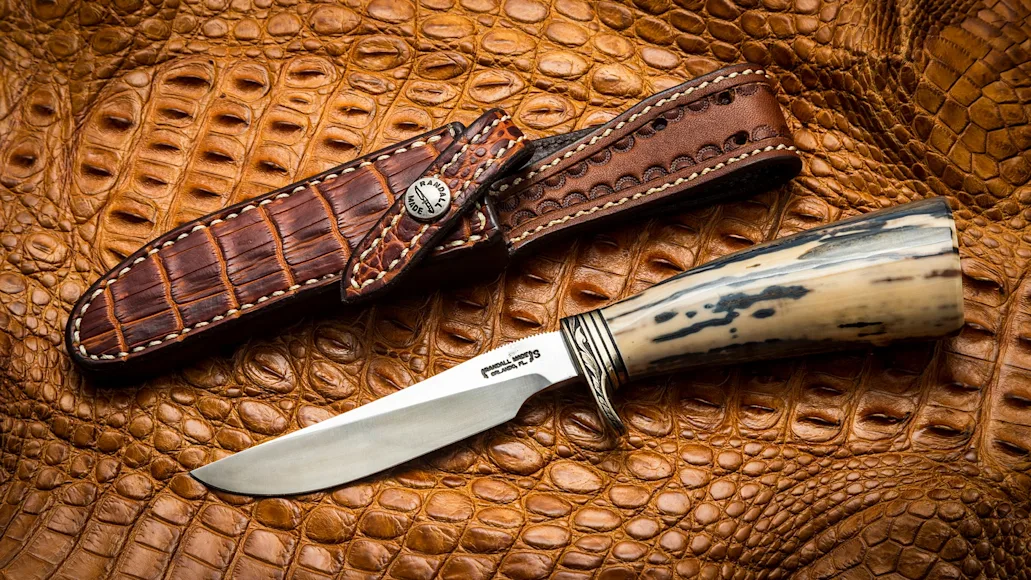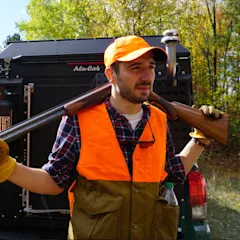FROM 1938 TO 1989, Bo Randall made some of the finest hunting, survival, and fighting knives in the world—and his family carries on the tradition to this day. Guy Clark wrote a song about a Randall knife. Bush pilots, hunters, and survivalists have relied on them. NASA even sent Randall knives into space.
In the early days, if you wanted a Randall, you got in line with GIs and sailors ordering blades before heading overseas. Today, demand is so high you have to wait six years to get a new one. This, in part, is why collectors dedicate their lives to searching for vintage Randall knives.
“It becomes a sickness,” says Randall dealer Duke McCaa. “I just facilitate the madness.” Together with collector Mitchell Harrison, McCaa runs the website randallmadeknife.com—an online marketplace and virtual museum for Randall Made Knives. Through the years, they have quietly built a collection of knives that include some of the finest examples Randall ever forged. Here are some of their favorites.

Top: A WWII-era knife known a Zacharias Fighter. It was named after Lt. James Zacharias, who contacted Bo Randall in 1942 to order a knife for his deployment. Zacharias’ knife was the basis for all Randall fighting knives that followed. The knife above is one of two known to exist out of four originals Bo Randall forged. Bottom: A Randall Made Commando knife, also from WWII. The Commando and the Zacharias launched Randall’s career as a bladesmith. These are two of the most historically significant Randall knives known today.

A very rare Model 3 from around 1964, assembled and embellished by Tom Leschorn. He was one of the few craftsmen outside of the shop that Bo Randall allowed to finish knives. This one has a “low S” on the blade to denote that it is made of stainless steel. Randall started making stainless knives in the 1950s but only started stamping them with an S in 1964.

Two Vietnam War–era Model 1 Fighters from the mid-1960s. The top knife has a stacked-leather handle, brass hilt, and aluminum butt cap. The bottom has a stag handle, brass hilt, and wrist thong. On fighting knives, thongs are used to keep the knife from slipping out of the user’s hand during combat.

Left: A very rare pre-WWII Model 3 Hunter. Bo Randall started making knives in 1938 but produced few until late 1942. This Model 3 has a handle made from pinned whitetail deer antler. Right: A mid-1940s Model 3 Hunter with a pinned stag handle and special forging—the blade is wider than normal.

A classic example of a WWII-era Model 1 Fighting Knife. Like most Model 1s from the 1940s, this one has a stacked leather handle, a brass hilt, and an aluminum butt cap. Among collectors, the sheath is known as a VL&A, which stands for Von Lengerke & Antoinne of Chicago, Illinois—one of a handful of early Randall knife dealers.

Duke McCaa uses a magnifying glass to examine the markings on a knife. The Randall company will work with only a small number of authorized dealers, and McCaa is one of them. He started buying and selling Randalls in the mid-1970s, when he bought one for $175 and sold it for $300. He has a personal collection of around 100 knives, many of which are Model 11 Alaskan Skinners.

Introduced in the mid-1960s, the Model 19 Bushmaster has a stout, thick blade for heavy use in the woods. This one has a Micarta handle and a riveted Johnson sheath, which is rare. Riveted sheaths were usually reserved for military Randalls. Randall collectors use differences in sheath construction to date and authenticate knives. Randall values are also tied to the sheath, and Randalls without original or period-correct sheaths will bring much lower prices.

Top: A Model 18 Attack-Survival model. The hollow crutch-tip handle was designed to store survival items. Bottom: The Model 14 Attack, shown here with a black Micarta handle and filled screw holes. Models 18 and 14 were the most popular Randall knives made during the Vietnam War. Both are pictured with their original riveted sheaths made by Maurice Johnson, who crafted most of Randall’s sheaths during this time period.

One of two Model 11 Alaskan Skinners with aluminum handles. The story is that a doctor ordered the knife with an aluminum handle because he wanted to be able to sterilize it in an autoclave. Bo Randall designed the Model 11 with the help of Tommy Thompson, a famous Alaskan bush pilot. The sheath for this particular knife was made by H.H. Heiser. The knife was crafted in the 1950s.

Andrew Hetherington
Mitchell Harrison inspects a Randall Model 3 Hunter. He started working with McCaa four years ago, when they bid on a large collection of Randall knives together. Harrison focuses on collecting Randall Model 1 Fighters, and he is an authority on Randalls from before the Vietnam War. He has also identified nine different sheath makers that have worked with Randall over the years.

Three Korean War–era Model 1 Fighters. They are pictured here with H.H. Heiser brown-button sheaths. H.H. Heiser Saddlery, of Denver, Colorado, made sheaths for Randall during the 1950s. (Note the difference between the riveted Johnson sheaths and the stitched Heiser sheaths shown here.) The handles, left to right, are pinned stag, stacked leather, and ivory with carved finger grips. Some Randall collectors focus only on handle materials.

In the early days of the space program, NASA commissioned Randall to make survival knives for astronauts. The design the company came up with was the Model 17 Astro, which includes a small screwdriver for removing its Micarta scales. Under the scales, there is a compartment to store survival items, like fishing line and hooks. The knife would have been used in the event of a crash landing in a jungle or other remote location. This one was made in the 1960s.


